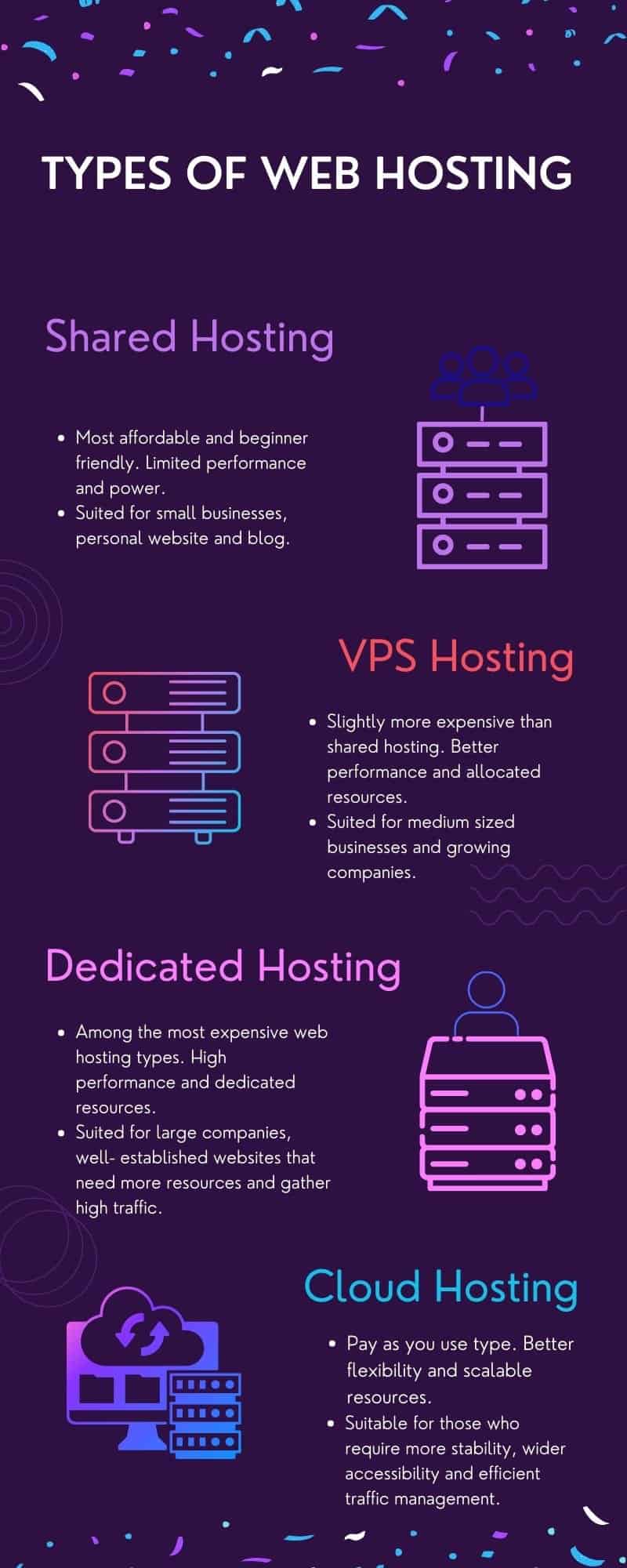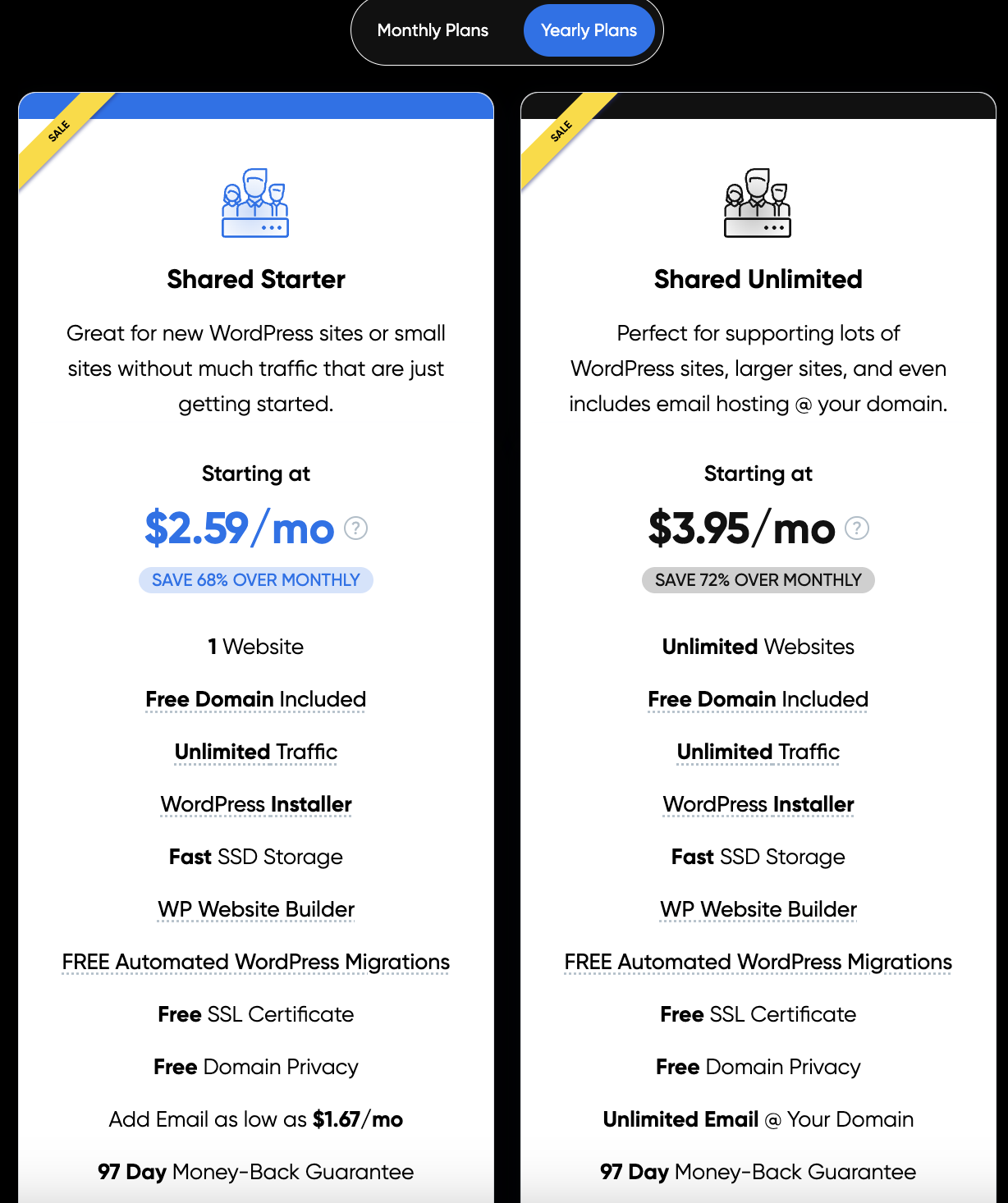Best Website Hosting Services for Small Businesses in 2025

In 2025, small businesses require reliable and efficient website hosting services to establish a strong online presence. With numerous options available, selecting the best hosting service can be daunting. This article aims to simplify the process by reviewing the top website hosting services for small businesses, considering factors such as pricing, storage, security, and customer support. We will explore the features and benefits of each service, providing insights to help small business owners make an informed decision and choose the best hosting service to meet their unique needs and goals. Effective hosting is crucial for success.
Key Features to Consider When Choosing the Best Website Hosting Services for Small Businesses in 2025
When it comes to selecting the best website hosting services for small businesses in 2025, there are several key factors to consider. These factors include scalability, security, customer support, pricing, and features. Small businesses need a hosting service that can grow with them, provide reliable security, offer excellent customer support, and fit within their budget. Additionally, the hosting service should offer a range of features such as e-commerce integration, email hosting, and website builders.
Understanding the Different Types of Website Hosting Services
There are several types of website hosting services available, including shared hosting, dedicated hosting, VPS hosting, and cloud hosting. Each type of hosting has its own advantages and disadvantages. Shared hosting is the most affordable option, but it can be less secure and less reliable. Dedicated hosting offers more control and security, but it can be more expensive. VPS hosting offers a balance between affordability and control, while cloud hosting offers scalability and reliability.
Importance of Security and Backup Features
Security and backup features are crucial when it comes to website hosting services. Small businesses need to ensure that their website and data are protected from hacking, malware, and data loss. Look for hosting services that offer SSL certificates, firewalls, and regular backups. Additionally, consider hosting services that offer automatic updates and virus scanning to ensure that your website is always secure and up-to-date.
Role of Customer Support in Website Hosting Services
Customer support is an essential aspect of website hosting services. Small businesses need to be able to get help quickly and easily when they encounter issues with their website. Look for hosting services that offer 24/7 support, live chat, and phone support. Additionally, consider hosting services that offer knowledge bases and tutorials to help you get started and troubleshoot issues.
Evaluating the Pricing and Plans of Website Hosting Services
Pricing and plans are critical factors to consider when selecting a website hosting service. Small businesses need to ensure that they are getting the best value for their money. Look for hosting services that offer flexible plans, discounts, and free trials. Additionally, consider hosting services that offer scalable pricing, so you can upgrade or downgrade as needed.
Top Website Hosting Services for Small Businesses in 2025
Here are some of the top website hosting services for small businesses in 2025:
| Hosting Service | Price | Features |
|---|---|---|
| Bluehost | $2.95/month | free domain, free SSL, unlimited bandwidth |
| HostGator | $2.75/month | free domain, free SSL, unlimited storage |
| SiteGround | $3.95/month | free domain, free SSL, daily backups |
These hosting services offer a range of features, including e-commerce integration, email hosting, and website builders, making them ideal for small businesses.
Which hosting type is best for a small website?

When it comes to choosing the best hosting type for a small website, there are several options to consider. The most important thing is to select a hosting type that meets the specific needs of your website. A small website typically requires a hosting type that is reliable, affordable, and easy to manage.
Shared Hosting for Small Websites
Shared hosting is a popular option for small websites because it is cost-effective and easy to set up. With shared hosting, multiple websites share the same server and resources, which can be a concern for security. However, most shared hosting providers offer robust security features to protect their customers' websites. Here are some benefits of shared hosting for small websites:
- Affordable pricing: Shared hosting is generally the cheapest option for hosting a small website.
- Easy to manage: Shared hosting providers often offer user-friendly control panels that make it easy to manage your website.
- Scalability: Shared hosting providers can easily upgrade your hosting plan if your website grows and needs more resources.
Dedicated Hosting for Small Websites
Dedicated hosting is a more advanced option for small websites that require more control and flexibility. With dedicated hosting, you have full access to the server and can customize it to meet your specific needs. However, dedicated hosting can be more expensive than shared hosting and requires technical expertise to manage. Here are some benefits of dedicated hosting for small websites:
- Full control: With dedicated hosting, you have complete control over the server and can configure it to meet your specific needs.
- Improved security: Dedicated hosting provides enhanced security features, such as firewalls and intrusion detection.
- Better performance: Dedicated hosting can improve the performance of your website, especially if you have high-traffic or resource-intensive applications.
Cloud Hosting for Small Websites
Cloud hosting is a flexible and scalable option for small websites that require on-demand resources. With cloud hosting, your website is hosted on a network of servers, which can dynamically allocate resources as needed. Cloud hosting is reliable and secure, and can handle high traffic and spikes in demand. Here are some benefits of cloud hosting for small websites:
- Scalability: Cloud hosting can easily scale to meet the needs of your website, without downtime or interruptions.
- Reliability: Cloud hosting provides high uptime and reliability, with multiple servers and redundant systems.
- Cost-effective: Cloud hosting can be more cost-effective than dedicated hosting, with pay-as-you-go pricing and no upfront costs.
What is the going rate for website hosting?

The cost of website hosting can vary greatly depending on the type of hosting, storage, and bandwidth requirements. The going rate for website hosting can range from a few dollars per month to several hundred dollars per month. It's essential to consider the needs of your website and choose a hosting plan that provides the necessary resources.
Types of Website Hosting
The type of website hosting can significantly impact the cost. There are several types of hosting, including shared hosting, dedicated hosting, and cloud hosting. Each type of hosting has its own advantages and disadvantages. For example, shared hosting is often the most affordable option, but it may not provide the same level of security and control as dedicated hosting. Some key factors to consider when choosing a hosting type include:
- Storage space: The amount of storage space needed for your website's files and data.
- Bandwidth: The amount of data that can be transferred between your website and its visitors.
- Scalability: The ability to easily upgrade or downgrade your hosting plan as your website grows or changes.
Factors Affecting Website Hosting Costs
Several factors can affect the cost of website hosting, including the size of your website, the amount of traffic it receives, and the level of support required. Additionally, the location of your hosting provider and the type of server used can also impact the cost. Some key factors to consider when evaluating hosting costs include:
- Server location: Hosting providers with servers located in high-cost areas may charge more for their services.
- Server type: The type of server used, such as a virtual private server (VPS) or a dedicated server, can impact the cost.
- Support level: The level of support provided, such as 24/7 support or priority support, can also affect the cost.
Choosing the Right Website Hosting Plan
Choosing the right website hosting plan can be a complex process, but it's essential to consider your needs and budget. It's crucial to evaluate the features and costs of different hosting plans to find the one that best fits your requirements. Some key factors to consider when choosing a hosting plan include:
- Uptime guarantee: A guarantee that your website will be available and accessible to visitors at all times.
- Security features: The security measures in place to protect your website and its data.
- Backup options: The backup options available to ensure your website's data is safe and can be restored in case of an emergency.
Is web hosting still profitable?

The profitability of web hosting has been a topic of discussion in recent years, with the rise of cloud computing and virtual private servers. Despite the increased competition, web hosting can still be a profitable business, especially for companies that offer high-quality services and competitive pricing. The key to success lies in providing reliable and secure hosting solutions that meet the needs of customers, while also offering excellent customer support.
Current State of Web Hosting
The current state of web hosting is characterized by a highly competitive market with many players offering similar services. However, this competition has driven innovation and improvement in the industry, with many companies offering advanced features and services to differentiate themselves. Some of the key factors that contribute to the profitability of web hosting include:
- Scalability: The ability to scale up or down to meet changing customer demands is crucial for web hosting companies.
- Security: Providing robust security measures to protect customer data and prevent cyber attacks is essential.
- Customer Support: Offering excellent customer support through multiple channels, such as phone, email, and live chat, is vital for building customer trust and loyalty.
Challenges Facing Web Hosting Companies
Web hosting companies face several challenges that can impact their profitability, including increasing competition, rising infrastructure costs, and evolving customer needs. To overcome these challenges, companies must be agile and adaptable, with a focus on innovation and customer satisfaction. Some of the key strategies for success include:
- Diversification: Offering a range of services, including domain registration, website design, and e-commerce solutions, can help companies diversify their revenue streams.
- Investment in Technology: Investing in new technologies, such as artificial intelligence and machine learning, can help companies improve efficiency and reduce costs.
- Focus on Customer Experience: Prioritizing customer experience and offering personalized support can help companies build strong relationships with their customers and drive loyalty.
Future of Web Hosting
The future of web hosting is likely to be shaped by emerging technologies, such as edge computing and quantum computing, which will require new infrastructure and new business models. To remain profitable, web hosting companies must be forward-thinking and innovative, with a focus on sustainability and social responsibility. Some of the key trends that will shape the future of web hosting include:
- Sustainable Hosting: The growing demand for sustainable hosting solutions that reduce carbon footprint and promote environmental sustainability.
- Artificial Intelligence: The increasing use of artificial intelligence and machine learning to improve customer support and service management.
- Edge Computing: The emergence of edge computing as a key technology for real-time data processing and low-latency applications.
Which hosting is best for startups?

When it comes to choosing the best hosting for startups, there are several factors to consider. The primary goal is to find a reliable and scalable hosting solution that can support the growing needs of the business. Startups require a hosting platform that is flexible, secure, and cost-effective.
Types of Hosting for Startups
The type of hosting that is best for startups depends on their specific needs and requirements. Some popular options include shared hosting, virtual private server (VPS) hosting, and dedicated hosting. Here are some key considerations:
- Shared hosting is a cost-effective option that is suitable for small startups with low traffic and limited resources.
- VPS hosting offers more flexibility and control than shared hosting, making it a good option for startups that require more resources and customization.
- Dedicated hosting provides the highest level of security and performance, but is also the most expensive option, making it suitable for large startups with high traffic and complex requirements.
Key Features to Consider
When evaluating hosting options for startups, there are several key features to consider. These include uptime, speed, security, and customer support. Startups should look for hosting providers that offer reliable and fast services, with strong security measures to protect their data and applications. Here are some key features to consider:
- Uptime is critical for startups, as downtime can result in lost revenue and customers.
- Speed is also essential, as slow loading times can negatively impact user experience and search engine rankings.
- Security is a top priority for startups, as they handle sensitive customer data and financial information.
Scalability and Flexibility
Startups need a hosting solution that can scale with their growing needs. This means looking for hosting providers that offer flexible plans and scalable infrastructure. Startups should also consider hosting providers that offer easy upgrades and downgrades, as well as 24/7 customer support. Here are some key considerations:
- Scalable infrastructure is essential for startups, as it allows them to quickly scale up or scale down to meet changing demand.
- Flexible plans are also important, as they allow startups to choose the resources and services they need, without being locked into a long-term contract.
- Easy upgrades and downgrades are critical for startups, as they need to be able to quickly adapt to changing requirements.
Frequently Asked Questions
What are the key factors to consider when selecting the best website hosting services for small businesses in 2025?
When selecting the best website hosting services for small businesses in 2025, there are several key factors to consider. First and foremost, reliability and uptime are crucial, as downtime can result in lost sales and revenue. Small businesses should look for hosting services that offer high uptime guarantees, such as 99.9% or higher. Additionally, speed and performance are essential, as slow-loading websites can negatively impact user experience and search engine rankings. Security is also a top concern, with strong firewalls, regular backups, and SSL certificates being must-haves. Furthermore, customer support and scalability are vital, as small businesses may need to quickly adapt to changing circumstances. By considering these critical factors, small businesses can choose a website hosting service that meets their unique needs and helps them succeed online.
How do I choose between shared hosting, VPS hosting, and dedicated hosting for my small business website?
Choosing between shared hosting, VPS hosting, and dedicated hosting depends on the specific needs of your small business website. Shared hosting is a cost-effective option that is suitable for small websites with low traffic, as it involves sharing resources with other websites on the same server. However, it may not offer the level of control and customization that some businesses require. VPS hosting, on the other hand, provides a virtual private server that offers more flexibility and resources than shared hosting, making it ideal for growing businesses. Dedicated hosting, meanwhile, offers a dedicated server that provides maximum control and resources, but is typically more expensive. By considering traffic, resource requirements, and budget, small businesses can select the best hosting option for their website and ensure optimal performance.
What are the benefits of using a website hosting service that offers e-commerce integration and support?
Using a website hosting service that offers e-commerce integration and support can provide numerous benefits for small businesses. For one, it allows for seamless integration with popular e-commerce platforms such as Shopify and WooCommerce, making it easy to set up and manage an online store. Additionally, e-commerce hosting services often provide built-in security features such as PCI compliance and SSL certificates, which are essential for protecting sensitive customer data. Furthermore, e-commerce hosting services may offer scalability and flexibility to accommodate growing sales and traffic, as well as expert support to help resolve any technical issues that may arise. By choosing a website hosting service with e-commerce integration and support, small businesses can streamline their online sales process and boost their revenue.
How can I ensure that my website hosting service provides adequate security and backup features to protect my small business website?
Ensuring that your website hosting service provides adequate security and backup features is crucial to protecting your small business website from cyber threats and data loss. First, look for a hosting service that offers strong firewalls, intrusion detection, and DDoS protection to prevent hacking attempts and malware infections. Additionally, choose a hosting service that provides regular backups, such as daily or weekly backups, to ensure that your website data is safe in case of a disaster. Furthermore, select a hosting service that offers SSL certificates to encrypt sensitive data and protect against eavesdropping. It's also essential to monitor your website's security and performance regularly, using tools such as security scans and performance metrics, to identify and address any potential issues before they become major problems. By taking these proactive measures, small businesses can protect their website and safeguard their online presence.
Leave a Reply